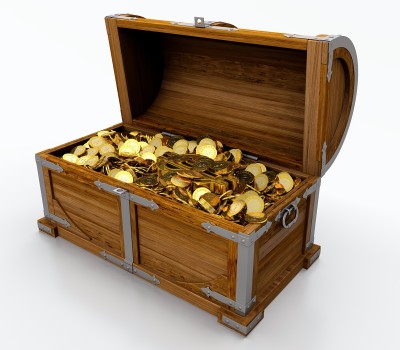If you want evidence of the durability of high-karat gold, visit the Metropolitan Museum. Some exquisite ancient gold jewelry goes on display there this month, and it’s not from Rome or Greece or the Middle East – although the Met has amazing examples of these in their permanent collections – it’s from Korea.
Buddha of gold, 4 ¾ in (12.2 cm), probably Amitabha (Korean: Amita), from the pagoda at Hwangboksa Temple site (National Museum of Korea, National Treasure 79)
Silla: Korea’s Golden Kingdom (at the Met now through February 23, 2014) puts the spotlight, literally, on some fabulous royal jewels, the kind that only survive unscathed when entombed for millennia – and made out of high-karat gold. The kingdom of Silla (57 B.C.–A.D. 935) was famous for its gold, and it’s a highlight of the 130 objects on display.
“This show is not to be missed,” said Thomas P. Campbell, director and CEO of the Metropolitan Museum of Art, when the exhibition was announced. “It is a rare opportunity to experience the visual splendor of the Silla kingdom in the first exhibition in the West devoted to the subject. These stunning works of art are rich in beauty and history, extending back to the first millennium and to a kingdom largely unknown to our audiences.”
Most of the jewels on display were loaned by the South Korean government. Having been designated “national treasures” there, these objects rarely appear outside that country. They include this ornate gold and jade crown from the late 5th century, excavated from the north Hwangnam Daechong Tomb in North Korea.
Crown of gold and jade, 10 ¾ in. (27.3 cm), 5th century, excavated from Hwangnam Daechong Tomb, Silla: Korea’s Golden Kingdom exhibition (Gyeongju National Museum, Korea, National Treasure 191)
Looking at some of the ancient gold jewels on display, it’s hard to believe they date back 1,500 years. Along with the fact that they’re made of high-karat gold, which doesn’t tarnish or disintegrate over time, one key to their remarkable condition is that most were never worn in real life.
Like the royal jewels excavated from King Tutankhamun (Ancient Egypt) and Ur (Ancient Iraq), these Korean jewels were created to make sure the royal wearers were properly adorned for the next life - which is to say, they were made specifically for the burial and then entombed.
Silla rose to prominence in the early 5th century, under the rule of a monarchy based in what we know now as the city of Gyeongju. Most of what we know about this kingdom comes from the objects preserved in those burial sites, which were added to the UNESCO World Heritage List in 2000.
You’ll find most of the jewelry in the first of three sections in the Met exhibition, the one that focuses on the 5th- and 6th-century royal tombs. Largest of these was the Great Tomb of Hwangnam, a 104,000-square-foot room where a king and his queen were entombed with gold regalia and jewels, including a belt and one of only five crowns found in Silla, as well as pottery and precious metal vessels.
The dangling bits in that crown look distinctly Southeast Asian, but the crown itself is less like the headdresses from the King and I or Balinese dancers (Buddhist temples) and more an elongated version of the crowns from medieval Europe. Objects collected by the aristocracy in 5th-century Korea were a mix of local culture and what the Met calls “the horse-riding cultures of the Eurasian steppes.” This section represents the period before Silla became truly cosmopolitan and started importing their jewels from Rome and central Asia. Korean’s wealthiest elite obviously had access to the beautifully-made jewelry we associate with other ancient cultures, including intricate goldwork such as granulation and repoussé.
Later, in the 7th century, Silla became part of the trade network between East and West, known as the Silk Road. In the second section of the exhibition, for example, you’ll find a repoussé silver bowl and an inlaid-gold sheath from Central Asia, along with vessels from the Roman Empire.
Dagger and sheath of gold inlaid with garnet and glass, 14 1/4 in. (36 cm), 5th century, excavated from Gyerim-ro Tomb (Gyeongju National Museum, Korea, Treasure 635)
Overall, you’ll find an exotic blend of ancient cultures in this peak inside Ancient Korea, mostly Asian with a little Rome thrown in, and a heady eyeful of ancient gold and gems.
For those interested in learning more, the Met is hosting a series of events around the exhibit. Best bet for gold lovers: the lectures on November 17 with live demonstration of goldworking techniques.
On December 4, a curator and archaeologist will discuss the nomadic cultures of Eurasia and the regalia found in tombs of the Silla Kingdom, and, just in time for Valentine’s Day, a Spark: From Silla to K-Pop on February 12, an event in the museum’s Grace Rainey Rogers Auditorium that requires a $30 ticket. For more info on gallery talks on the exhibition, tomb culture and the spread of Buddhism in Asia, visit the website.








